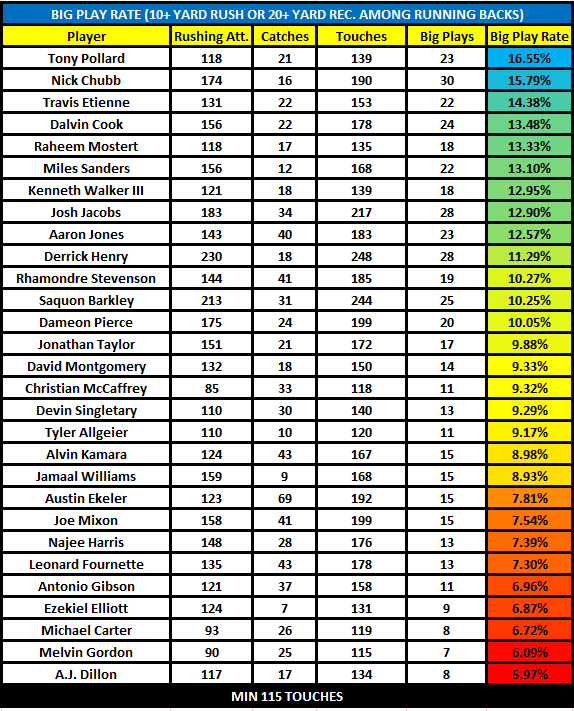Tony Pollard was in his bag on Sunday against the Vikings, and in that bag he found the headlines from this past summer when there was talk of the Cowboys using him as a slot receiver. In addition to rushing for 80 yards on 15 carries, the running back also caught 6 passes for 109 yards and two touchdowns. With impressive numbers at two different offensive positions, few if any are surprised that Pollard was named NFC Offensive Player of the Week.
Tony Pollard became the third Cowboys running back to win NFC Offensive Player of the Week since 1990 (Emmitt Smith and Ezekiel Elliott). Pollard had a career-high 189 total yards in 40-3 win over Vikings, including TD catches of 30 and 68 yards. pic.twitter.com/EAuU8YQJyw
— Michael Gehlken (@GehlkenNFL) November 23, 2022
Week 11 wasn’t the first time Pollard has logged a few receptions. It was, however, his most explosive and headline-grabbing performance in that role so far this season. Pollard’s on-field performances seem to have become more impressive week over week for the past month or so. In Week 6, he only rushed for 44 yards against the Eagles, but he almost doubled that the following week against the Lions by rushing for 83 yards. In Week 8, he achieved career highs in both rushing yards, with 131 yards, and touchdowns with his three trips to the end zone. Against the Packers in Week 10, he recorded a personal best in rushing attempts with 22 carries. He was also targeted six times during that game but ended the game with only 3 receptions for 13 yards.
The Synergy of TP and Zeke
Even though his impact had been increasing with each game, it was Ezekiel Elliott who was the designated starter for Week 11, but the Cowboys have developed a reputation for dismissing the implications of terms like “starter,” “backup,” “No.1,” “receiver,” “running back,” and so on. Instead, they employ an innovative approach that involves capitalizing on players’ strengths and using their skills to execute strategies designed to best their opponents as opposed to using position and rank to determine player involvement. The prevalence of “Pollard vs Elliott” debates suggests that fans and some members of the media are still struggling to grasp this concept. Yesterday, Pollard put it quite simply saying, “When both [Zeke and I are] out there having the type of game that we had, and the offensive line [is] is out there working how they did, it just helps the whole team go, helps the offense go, and everything gets flowing.”
By the Numbers
After his performance against the Vikings, some analysts began making the case for Pollard as the NFL’s best running back and as the league’s most dangerous offensive weapon. The most convincing pieces of evidence to support these superlatives are his career average yards per attempt, average yards after contact, and his big play rate as defined by Pro Football Focus.
There is only one active running back with at least 400 attempts that averages more yards per carry on their career.
Highest rushing yards per attempt in NFL career (min 400 carries): pic.twitter.com/SH3wPm8IQg
— Marcus Mosher (@Marcus_Mosher) November 21, 2022
Something else that stands out about TP’s play is his propensity for slipping through contact and breaking tackles. He ranks third in yards after contact among all NFL running backs with at least 125 carries.

When it comes to making big plays, Pollard leads all other NFL running backs with at least 115 touches. Pro Football Focus defines big plays as carries of 10 yards or more or receptions of 20 yards are more. Pollards rate currently sits at 16.55%. If recent stats are any indication, that rate is expected to increase.

Fans are expecting an impressive showing from Pollard against the Giants this Sunday. The Giants rush defense is currently ranked the second worst in the league. They give up 5.3 yards per carry on average. For an explosive, deceptively forceful, dual threat like Tony Pollard, this might be an opportune time to really show off.